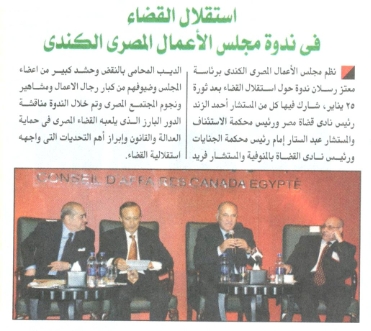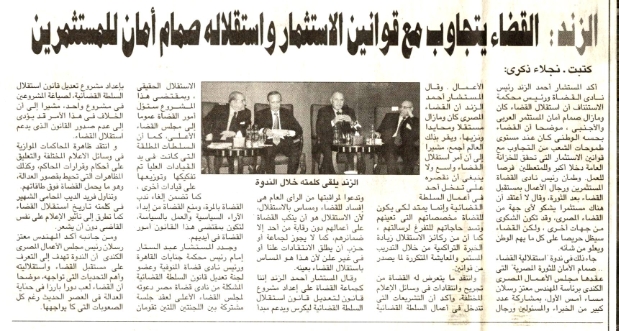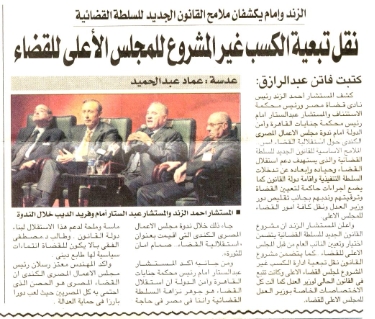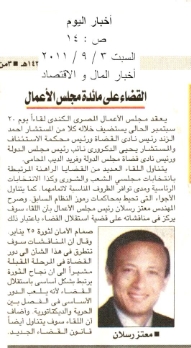
Date
Speaker(s)
Designation
Description
The Canada Egypt Business Council (CEBC) hosted a special event and panel discussion featuring Counselor Ahmed El Zind, President of the Egyptian Judges Club, Counselor Abdel Sattar Imam, President of the Criminal and State Security Court and President of the Judges Club in Monufeya and the prominent lawyer Farid El Dib. The event aimed at discussing the independence of the Egyptian judiciary, before and after the revolution and its quintessential importance during this critical time as one of few guarantees towards successful accomplishment to the revolution’s demands.
The event is the fifth in a series of events addressing economic and political issues pertaining to Egypt after the revolution. The challenges facing the judiciary’s independence, its future in light of the revolution were the central focus of the discussions. A new judiciary law drafted by the Judges Club, that targets ridding the existing system of all the loopholes the government used in the past to breach the judiciary’s independence was also discussed. The effects of the media coverage of court proceedings on the judges’ complete impartiality and independence was particularly delved in at depth.
Over 250 prominent guests attended the event from ministers, ambassadors, CEBC members and guests, former Prime Ministers Abdel Aziz Hegazy and Dr. Ahmed Shafik, Dr. Mostafa El Fekki, former ministers Dr. Ibrahim Fawzy, Dr. Ali Moselhy, Counselor Adly Hussein and other prominent figures from the political and the business sectors.
CEBC Chairman, Mr. Motaz Raslan, delivered the opening remarks for the discussion. In his remarks, he highlighted that the vagueness that has dominated the Egyptian political arena after the revolution is starting to clear. Raslan confirmed that he sees that Egypt is indeed on the path to achieve what the revolution erupted to demand. Trials of the corrupt symbols of the former regime are putting the judiciary in the spotlight, he said. “The outcome of these trials will be determinant of the future of Egypt”, Raslan added. He resumed to pinpoint the role of the Egyptian judiciary in the past as the sole protector of justice in times when corruption was prevalent. He spoke of their historic role in the eruption of the revolution, since it was their judicial supervision of elections that allowed them to expose to Egyptians the outrageous forgery, which took place in the last parliamentary elections in 2010. This for the most part was the first spark of the revolution. He resumed to assert the need to discuss the judiciary power, especially in light of the controversy around the proposed amendments that are to take place on the judicial law, saying that it will carry in its folds multiple benefits for the judiciary and for the entire country. He concluded his remarks by stressing on the crucial need for a judiciary body that faithfully brings justice to Egypt.
Raslan then left the floor to Counselor Ahmed El Zind, President of the Egyptian Judges Club who started his speech affirming that the judicial independence is not merely the ‘safety valve’ for the revolution, but also for Egypt and Egyptians throughout history. On these grounds, he stated that the public opinion ceases to alienate numerous figures by accusing them of being traitors, for taking part in the former regime.
Counselor El Zind expressed his steadfast faith in the Egyptian judiciary, past and present strongly asserting that the Egyptian judiciary has always been independent, just and unbiased. He moved on to say that over the course of numerous regimes the executive power often pushed to legislate laws that would breach on this sacred independence. He assured that it is the law that binds a judge, and that as it is his job to implement it, he himself is subject to it.
“The minister of justice, representing the executive power, often breached this independence, however, it was entirely dependant on each minister”, Counselor El Zind said. He also highlighted that despite this predicament and despite unjust laws, judges were resisting all attempts to influence or sway their judgments. He elaborated by saying that the media’s involvement in covering court proceedings and the manner in which it either follows or stirs up the public opinion is detrimental to judicial independence. “The public opinion’s supervision over the judiciary is nonsense,” he said. “The sole check for a judge is his own conscience and the law” he explained.
El-Zind then spoke of the new proposed judiciary law. The law is meant to eliminate many of the loopholes former regimes have created to override the judicial independence. He named a few of the changes it will implement. The most significant of which is the transfer of the functions of the ministry of justice to the Supreme Judiciary Council, unifying the grounds upon which a judge is to be chosen by seniority, eradicating judiciary positions which had unlimited powers, abolishing assigning judges temporarily to work in different executive functions and eliminating the ministry of finance’s control over the state budget assigned to judges among other valuable changes.
He assured the attendees that in light of the new law, the judiciary will be safely sheltered from attempts to breach its independence. He concluded his word asserting the impartiality and integrity that the Egyptian judiciary upholds specifically in trials involving investors coming to Egypt.
After Counselor ElZind’s speech, Counselor Abdel Sattar Imam, President of the Criminal and State Security Court and President of the Judges Club in Monufeya, who is also a member in the committee working on the proposed amendments to the judiciary law, assumed the floor. He commenced his words praising the choice of the subject of discussion, pinpointing that it is directly related to the revolution’s primary demand, justice.
Counselor Imam, as opposed to the previous speaker, spoke of the many distortions the judiciary had witnessed in past regimes. He said that in light of the past regime, the law was only occasionally implemented and the regime decided when it should and when it should not be upheld. He explained that this resulted in elimination of the separation of powers and the compromising of the rule of law, which in turn resulted in the revolution. He said that while the revolution has succeeded, it is yet to build a new regime based on the rule of law and that this can be done through proper laws and fair judiciary power.
“It is not a judicial matter but a national one that touches upon every civil right,” said Counselor Imam. He also drew attention to the grave importance of the means by which the attorney general is assigned his post. The counselor warned, as well, of the consequences of judges’ involvement in politics, which is something that is becoming alarmingly prevalent lately.
In conformation to Counselor El Zind’s views on media coverage of proceedings, the former said, “provocative media coverage and violence are the major crimes that are threatening Egypt”. He continued to say that if the nation loses trust in the judiciary, there would be no guarantors of justice left. He condemned the violence that has been taking place as a result of sentences that do not appease to public opinion, as well as, the constant calls in the media for revenge from the suspects that have not been convicted of any crimes yet. “If judges maintain their integrity, the whole nation is well and if they deviate from the just path, the entire community crumbles and falls,” was the counselor’s concluding statement.
The floor was then assumed by the renowned lawer Farid El Dib who defended prominent figures in court in numerous cases that were the center of public attention. He represented Naguib Mahfouz’s family, the famous journalist, Mostafa Amin, former president Anwar El Sadat’s family, and is currently leading ex-president Hosni Mubarak’s defense team in the ongoing trials. El Dib started his word with an eloquent quote from what he described as the first law concerned with judicial independence. The law was issued in 1943 and spoke of the essence of a judge’s independence as being primarily a matter of his own will and conscience.
El Dib spoke of the effect media coverage had on a judge’s impartiality. He warned that a judge, who is exposed to a media storm involving his case, is likely to be affected in one way or the other, without even being aware of the influence the media is having on him. The veteran lawyer highlighted that in some countries the least amount of pressure from the public that could be in the form of media coverage or demonstrations calling for a certain verdict, causes the cessation of court proceedings or pressing charges against the source of pressure, because it may have compromised the impartiality of the trial.
In regard to the many loopholes in the judiciary law, El Dib had a different point of view from the esteemed judges. “Laws were never an obstacle for a dictator”, he said. He further explained that in the past regimes, laws were often broken openly by the executive power to serve its purposes. He also condemned several past practices that the judges addressed such as the temporary assignments of judges to executive posts, which he described as “a camouflaged bribe”. El Dib also criticized the loophole that allows the defendants in a case to choose the court of jurisdiction, which was detrimental to the fairness of trials. He concluded his word stressing on the importance of educating and training the judge to be impartial and uninfluenced by any type of pressure.
El Dib was the final speaker before the floor was opened to the attendees’ comments and questions. The attendees voiced their concerns about particular judges who have affiliated themselves with the Muslim brotherhood. They were also concerned with what some of them saw as division within the different groups of judges, concerning the proposed judicial law, among other issues concerning the topic.
The judiciary is the guarantor of justice and the rule of law in Egypt; it always has and always will be. This seemed to be the conclusion the attendees grasped at the end of this event.




























